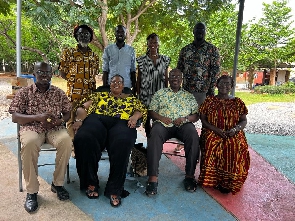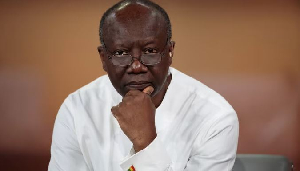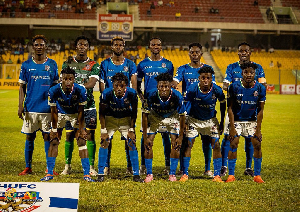The newly elected Functional Executive Committee of the Ghana Culture Forum (GCF) and the initial co-conveners of the organisation have met in Accra to discuss matters concerning the Forum.
GCF is the foremost cultural advocacy platform and umbrella network of practitioners in the Ghanaian cultural space.
The meeting amongst many other things was to interact with the pioneering leadership of the GCF and it covered a wide range of issues affecting culture and the creative industries in Ghana.
The current executives were elected on 14th March 2023 at the 3rd National Delegates Conference of the GCF to serve on the National Functional Executive Committee (FEC). All seven members of the FEC were present in the meeting with Professor Esi Sutherland-Addy, Akunu Dake and Administrative Secretary for the GCF Secretariat, Patrick Bortey Alabi.
The executives are the Chairperson, Nana Otuo Owoahene Acheampong; Vice Chair,– Ahuma Bosco Ocansey; General Secretary, Edwina Assan and Treasurer, Makeba Boateng with three executive members – Samuel Dodoo, Ken Fiati and Samuel Gyandoh.
The co-conveners shared the ideals and foundations upon which the Forum was established with the new executives. They also highlighted the key objectives of the Forum, the successes chalked so far, the challenges faced, and key strategies to sustain the Forum.
Professor Esi Sutherland-Addy noted that the Ghana Culture Forum was formed in response to a crying need to mend up the splinter frontiers of the cultural sector, to collectivize and present a strong singular voice to intervene on cultural issues by speaking truth to power.
The ideals of collectivization and the quest to hear and listen to views from all domains of the cultural spectrum were immediately challenged by issues of language and elitism. She reckoned that the initial leadership creatively managed the situation by making everyone feel needed and important which quickly drew in less-bookish members and associations.
The co-convenor, Akunu Dake, advised the new leadership to ensure that they stay in close contact with the member associations. This is because the strength of the Forum is a function of the vibrancy and commitment of these associations.
He the executives that their intervention in the cultural life of this country is to offer and raise a new consciousness for the people of Ghana.
Delivering on this mandate requires total commitment and the denial of the self, to be able to emerge as leaders of a new kind. He, therefore, advised the team to assimilate and internalize the constitution of the GCF, especially the preamble which crystalizes all that issues raised by his compatriot: to contribute towards the development of a progressive national culture.
He added that the GCF runs a unique operational model within the Ghanaian civil society space with the overriding objective to affect the lives of the people of Ghana through the vehicle of culture and arts, which is the highest form of human essence.
Although the GCF is political in nature, it is expedient the organisation stays non-partisan because of all the things it seeks to do and stands for. The initial co-conveners encouraged the new leadership to continue to dispel the negative branding of the forum as a partisan group by “people in high places” who do not understand the concept and model of the GCF.
They recounted key strategies adopted in the past in staying above the negative narrative. They called on the leadership to be strategic in dealing with the political class and policymakers by persistently advocating on cultural issues and upholding high standards of integrity and credibility. Funding strategies and ideas were discussed at the meeting.
Background
The Ghana Culture Forum was proposed and initiated at the UNESCO-led Consultative Forum on the “Power of Culture in Development” held at the erstwhile African Royal Beach Hotel, Nungua, Accra on 28th April 2011.
It dawned very strongly on participants that if they had not had UNESCO bringing them together, they would actually have no platform on which to discuss the strategies for mainstreaming culture in national development. It was clear that the time was long past when a Civil Society Advocacy Forum on Cultural Heritage should be formed to pursue and intervene on issues related to the domain and its place in overall national development policies.
Sixteen pioneers (Kodzo Gavua, Michael Neequaye, David Dontoh, Akofa Edjeani, Amandzeba Brew, Akosua Ofori Mensah, Nanabanyin Dadson, Pajohn Bentsifi Dadson, Nii Osei Agyei, Kofi Akpabli, Louise Akanlu, Jojo Richardson, Modupe A. Nukumu, Daphne Akonor, Akunu Dake and Esi Sutherland-Addy) started working together to establish GCF as the advocacy platform for culture and development action.
Since the official launch on 14th March 2012, Esi Sutherland-Addy (Professor) and Akunu Dake served as co-conveners for the interim leadership till March 2019 when substantive leadership emerged after elections during the 2nd National Delegates Conference.
Entertainment of Thursday, 20 April 2023
Source: Ahuma Bosco Ocansey, Contributor













